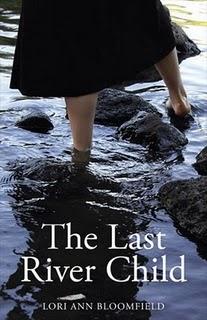The Last River Child

The Last River Child is the story of a town caught up in a legend: they believe there are children possessed by the spirit of the river meant to bring misfortune to everything around them. Everyone is taught to stay away from the river, but a young girl named Peg feels drawn to the river and refuses to believe the story. She becomes an outcast and whenever something goes wrong in the town, it’s blamed on her.
The book begins with the story of Rose, Peg’s mother, who grows up alienated from her family and peers. Her story is told in a few chapters, and then continues with Peg’s own childhood. Her life is full of strange coincidences and unfortunate occurrences, including a meteor hitting the town on the day of her baptism and her mother’s death on the day World War I is declared. The town is affected by the war in all the ways you might expect, but in that time, Peg finds friendship in a boy from a neighboring town and by becoming pen pals with her sister’s husband.
While the story itself is an interesting one, what makes this book compelling are the relationships between the characters. Peg’s mother, Rose, has a bad relationship with her family and is also an outcast in the town she grew up in. As soon as she gets the chance, she takes matters into her own hands, moves away and marries a man with whom she develops a close relationship. When they have children, their relationship becomes strained. Peg’s father resents her and her sister, Sarah, and I couldn’t help but sympathize with him later in the novel as he becomes more aware of his treatment of his daughters and wife.
I can’t discuss the relationships in this book without touching on Peg’s relationship with Sarah. Because of her label as a "river child," Peg grows up spending most of her time by herself because her sister Sarah values her friendships more than the relationship with Peg. They grow up alongside each other, but not really together. When circumstances force them to spend several months alone together, their relationship is put to the test. It’s strengthened at first, but then expectedly splinters.
The one criticism I have of this otherwise great book is the lack of relationships between women. Rose resented her mother, Peg and Sarah aren’t close, Sarah’s more interested in her desire to be with her best friend’s brother than in strengthening the relationship with her best friend, and the only meaningful relationships Peg forms are with men. I was admittedly quite happy to see Peg become friends with anybody by that point in the novel, but it would have been nice to have one healthy relationship between women somewhere in the book.
Despite this, I really did enjoy The Last River Child. It was satisfying to see Peg gain more confidence and take control of her life, just as Rose had done so many years earlier. While the book lacked strong relationships between women, it certainly didn’t lack strong female characters.